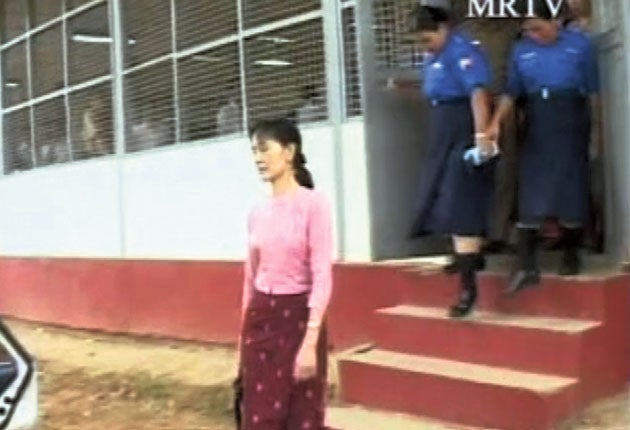'Crackling with energy', Suu Kyi finally emerges into the light
Burmese democracy leader leaves her home for the first time since 2003 as 'secret' trial begins

Your support helps us to tell the story
From reproductive rights to climate change to Big Tech, The Independent is on the ground when the story is developing. Whether it's investigating the financials of Elon Musk's pro-Trump PAC or producing our latest documentary, 'The A Word', which shines a light on the American women fighting for reproductive rights, we know how important it is to parse out the facts from the messaging.
At such a critical moment in US history, we need reporters on the ground. Your donation allows us to keep sending journalists to speak to both sides of the story.
The Independent is trusted by Americans across the entire political spectrum. And unlike many other quality news outlets, we choose not to lock Americans out of our reporting and analysis with paywalls. We believe quality journalism should be available to everyone, paid for by those who can afford it.
Your support makes all the difference.After nearly six years hidden from sight, suddenly yesterday Aung San Suu Kyi was back on public view – tranquil, composed, yet "crackling with energy".
Until yesterday Burma's democracy leader was being tried in secret, somewhere deep inside Rangoon's Insein prison. Then without warning or explanation, the generals threw open the doors of the court to diplomats and even a handful of (local) journalists.
Hardly anybody has set eyes on Ms Suu Kyi since she last disappeared behind the doors of her home in July 2003. UN special envoy Ibrahim Gambari has met her a couple of times, at his insistence, as have the senior leadership of the National League for Democracy (NLD), her party. In November 2007 she came out of her home to pay respects to thousands of monks demonstrating against the regime who had succeeded in getting as far as her villa. But that's it.
No diplomats, no friends, no relatives, no journalists, no party members, practically no one has seen her – with the disastrous exception of John Yettaw, the American who got it into his head to swim Inya lake to drop in on her, and gave the regime the excuse to put her on trial.
But there she was in court, in a salmon Burmese jacket and maroon sarong, as poised as ever. "She was ramrod straight, dignified, composed," said British ambassador Mark Canning, a witness to the event in company with 10 other ambassadors. "She seemed to crackle with energy – you could see the way she commanded her defence team, and in fact commanded the wider courtroom."
"She sat listening intently and alertly to what was going on," said Philippines chargé d'affaires Joselito Chad Jacinto. "She exuded an aura which can only be described as awe-inspiring."
It was at 10 o'clock yesterday that the secret trial abruptly turned into a show trial. "We were called to the Ministry of Foreign Affairs at 10 o'clock in the morning," said Mr Canning. "We thought it was going to be the usual explanation of the Myanmar [Burma] government position. Instead we were told that within two hours we would be in the courtroom." Overnight the secret trial turned into a show trial.
The democracy icon and Nobel Peace Prize-winner, who has spent 13 of the past 19 years under house arrest, is accused of violating the terms of her detention by allowing Mr Yettaw, a Vietnam veteran and Mormon, to spend two nights in her family's villa on Lake Inya in the suburbs of Rangoon. Ms Suu Kyi reportedly pleaded with him to leave but relented when he insisted that he was too exhausted to swim back. If found guilty she could be jailed for up to five years.
Her latest spell of detention expires later this month. She remains hugely popular with the Burmese masses, and the trial is widely seen as an excuse for the regime to keep her out of the way during elections scheduled for next year. In 1990 the National League for Democracy won a landslide victory in Burma's last general election, but the military junta refused to honour the result.
The hearing itself was humdrum: a policeman gave evidence for the prosecution. At the end of the proceedings she asked the court if she would be violating any security laws if she addressed the diplomats. Receiving a negative answer she called out to them in English, greeting them and saying: "I hope to meet you again in better times."
It was unclear whether diplomats will also be allowed to attend subsequent hearings. But it did not change the gloomy consensus that the trial itself is a fix. "It was good as far as it went," Mr Canning said of the opening up of the trial. "It was better to have access than not. But we shouldn't lose sight of the fundamental issues. We demand her release, and the release of the other 2,000 political prisoners locked up in Burma."
Join our commenting forum
Join thought-provoking conversations, follow other Independent readers and see their replies
Comments